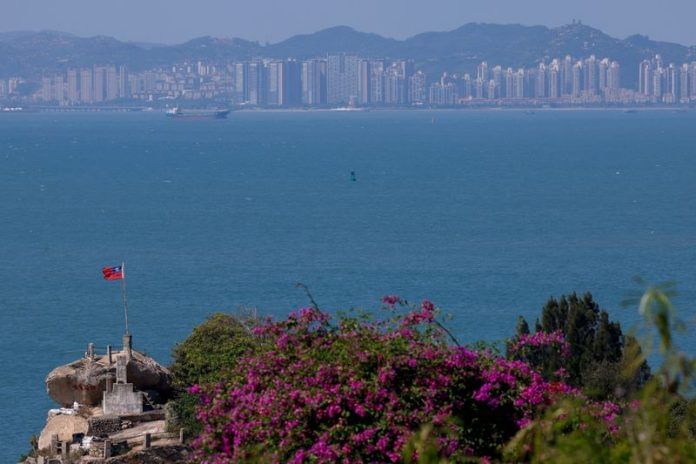By Yimou Lee and Ben Blanchard
TAIPEI (Reuters) -Taiwan is warily watching whether China could seek to try and exert economic control over sensitive frontline Taiwanese islands in a key development plan being discussed in Beijing this week, officials familiar with the matter said.
China’s ruling Communist Party, at its closed-door meeting ending Thursday known as a plenum, is going to discuss, among other things, the country’s 15th five-year development plan, which will formally begin next year and be unveiled in detail at March’s annual meeting of parliament.
Two officials briefed on the matter told Reuters that Taiwan is paying particular attention to whether the new five-year plan makes any mention of deepening economic integration with the Taiwan-controlled Kinmen islands that sit just off China’s coast.
China has long taken a carrot and stick approach to Kinmen, threatening it with frequent coast guard incursions into its waters while dangling perks from gas and electricity supply to bring the islands of 140,000 closer to China.
For policy makers in Taipei, Kinmen’s proximity to China makes it extra vulnerable to Beijing’s economic and political clout, especially when many residents there have close family and business ties with China, whose Xiamen city is a short boat ride away for work or shopping.
Kinmen also gets regular water supply from China, a deal secured under the previous government led by the Kuomintang party which favours close relations with Beijing.
China, which has not ruled out using force to seize democratically governed Taiwan, could seek to gain de facto jurisdiction over Kinmen if it includes it in its economic development plan, a move that would further escalate Taipei-Beijing tensions, the officials told Reuters.
“Cross-strait relations could shift from past sovereignty disputes to a contest over jurisdiction,” said one of the sources, a senior Taiwan official briefed on the matter, speaking on condition of anonymity given the sensitivity of discussing security assessments.
A second source, an official in the region looking into the issue, said with a new economic blueprint China could try to exert “de facto administrative power” over Kinmen and push for its unification agenda.
Taiwan’s Mainland Affairs Council said it would not comment on the story before any Chinese policy details from the plenum are released later this week. China’s Taiwan Affairs Office did not respond to a request for comment.
Jessica Chen, Kinmen’s Kuomintang member of parliament, told Reuters that China indeed wanted closer economic integration for Kinmen, but that sovereignty could not be compromised.
“Kinmen is the territory of the Republic of China. Its jurisdiction belongs to the Republic of China – this is beyond doubt,” she added, referring to Taiwan’s formal name.
Five-year plans have previously mentioned Taiwan in a vague way, though in 2016 the 13th five-year plan proposed a tunnel to the island and opening of a high-speed rail line. Taiwan rejected that idea.
‘NEXT CRIMEA’
China’s still-in-construction bridge to Kinmen is a major concern for Taiwan, a project Taipei has not approved, as is the new Xiamen airport slated to open next year and which is only around 3 km (1.9 miles) at its closest point from Kinmen, the officials said.
Taiwan officials worry greater integration could chip away at Taiwanese sovereignty. China says Taiwan is not a country, only a Chinese province, and that it has no sovereignty.
“What if they try to press ahead with the bridge, which carries national security concerns for us?” the Taiwan official said, adding such a proposal could also sow division between local residents and central government as well as the military.
“If they dare to invade (Kinmen), we will become the next Crimea,” the official said, referring to Russia’s annexation of Crimea in 2014 after people there voted in a disputed referendum to become part of Russia.
To be sure, there are differences with Crimea, where many people identify as Russian, not Ukrainian, whereas in Kinmen most people identify as being Chinese, albeit from the Republic of China.
Xiamen’s new airport is so close to Kinmen it could pose an aviation safety risk, and China has not reached out to discuss the issue, the official said.
China last year opened a new air route from Xiamen which Taiwan said was done without consultation and brought aircraft too close to Kinmen airspace, posing aviation and security concerns.
The new airport could offer another way for China to further jurisdiction claims over Kinmen, the official added.
“Mutual development is not a bad thing,” the Taiwan official said. “But if this is for the purpose of annexation, that’s a problem.”
(Reporting by Yimou Lee and Ben Blanchard; Editing by Stephen Coates)
Disclaimer: This report is auto generated from the Reuters news service. ThePrint holds no responsibility for its content.






